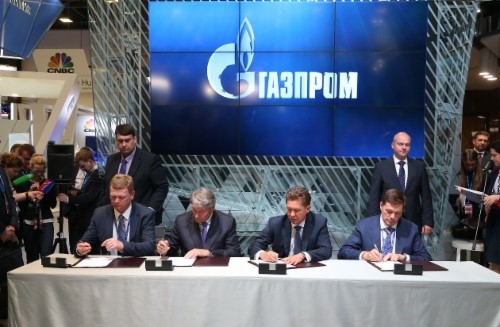Sanctions? What Sanctions? Russian Gazprom Buys Local
Russian gas giant Gazprom has mitigated the worst effects of the economic sanctions imposed on Russia following its intervention in Ukraine that started with the annexation of Crimea in March 2014.
The company’s board of directors met to discuss the consequences August 23 and said in a statement that sanctions had left it “largely unaffected, including with respect to the execution and extension of existing contracts and the conclusion of new contracts for gas supplies with foreign parties, and have had little bearing on the company's ongoing activities.”
The Russian economy is also struggling and the weak rouble means Gazprom has less to spend on imports and so it has relied heavily on domestic equipment. This has improved the quality of domestic products, built to international specifications.
Foreign equipment accounts for about 5% and pipes for less than 0.1% of Gazprom’s total purchases. The goods that it does import come from newer suppliers as well, such as the former Soviet Union, India and China.
Gazprom has signed long-term, take or pay contracts with Russian steel mills TMK and United Metallurgical Company (OMK). Gazprom will receive seamless casing and pump and compressor pipes made of corrosion-resistant materials from TMK and special-purpose high-temperature and heavy-duty ball valves from OMK.

Four bosses agree on technology co-operation in June 2016 (L-R): Alexey Mityushov (Salavatneftemash), Wolfgang Buechele (Linde), Alexey Miller (Gazprom), Alexey Mordashov (Power Machines)
Gazprom has also created demand for high-tech products such as wellhead equipment, shut-off and control valves, pumps and compressors, power equipment, telemechanics systems, and adsorbent materials.
It has also moved into natural gas liquefaction research and development with Germany's Linde and Russian firms Power Machines and Salavatneftemash. At the St. Petersburg International Economic Forum in June 2016, they signed an agreement to explore the possibilities for joining efforts in manufacturing natural gas liquefaction and processing equipment.
Gazprom also says it “pursues a sound financial policy that secures the company's financial stability. Gazprom enjoys free access to international capital markets and is able to take out loans on reasonable terms. The company enlarges the range of its financial instruments and diversifies loan sources, including through enhancing its cooperation with Asian credit institutions.”
It was Asian credit institutions that lent heavily – and took stakes in – Yamal LNG, as operator Novatek was on the sanctions list. The company is co-owned by Gennady Timchenko, an ally of Russia's president, Vladimir Putin, and as a consequence it took longer to raise the money.
Gazprom and its five western partners have been blocked from forming the Nord Stream 2 joint venture, by the Polish competition authority, which could have an adverse effect on Gazprom's cost of capital. However Swiss-based Nord Stream 2, owned 100% by Gazprom, has declined to comment on this.
William Powell


